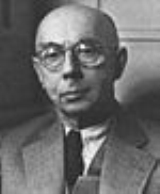
Gustav Ludwig Hertz
Overview
Nobel Prize
The Nobel Prizes are annual international awards bestowed by Scandinavian committees in recognition of cultural and scientific advances. The will of the Swedish chemist Alfred Nobel, the inventor of dynamite, established the prizes in 1895...
winner, and a nephew of Heinrich Rudolf Hertz
Heinrich Rudolf Hertz
Heinrich Rudolf Hertz was a German physicist who clarified and expanded the electromagnetic theory of light that had been put forth by Maxwell...
.
Hertz was born in Hamburg
Hamburg
-History:The first historic name for the city was, according to Claudius Ptolemy's reports, Treva.But the city takes its modern name, Hamburg, from the first permanent building on the site, a castle whose construction was ordered by the Emperor Charlemagne in AD 808...
and studied at the Georg-August University of Göttingen
Georg-August University of Göttingen
The University of Göttingen , known informally as Georgia Augusta, is a university in the city of Göttingen, Germany.Founded in 1734 by King George II of Great Britain and the Elector of Hanover, it opened for classes in 1737. The University of Göttingen soon grew in size and popularity...
(1906-1907), the Ludwig Maximilians University of Munich
Ludwig Maximilians University of Munich
The Ludwig Maximilian University of Munich , commonly known as the University of Munich or LMU, is a university in Munich, Germany...
(1907-1908), and the Humboldt University of Berlin
Humboldt University of Berlin
The Humboldt University of Berlin is Berlin's oldest university, founded in 1810 as the University of Berlin by the liberal Prussian educational reformer and linguist Wilhelm von Humboldt, whose university model has strongly influenced other European and Western universities...
(1908-1911). He received his doctorate in 1911 under Heinrich Leopold Rubens
Heinrich Rubens
Heinrich Rubens was a German physicist.He played a direct role in the genesis of the quantum theory, providing the experimental results that pushed Max Planck to provide the first quantum hypothesis.He also combined scientific ideas to create the Rubens' tube.-External links:*...
.
From 1911 to 1914, Hertz was an assistant to Rubens at the University of Berlin. It was during this time that Hertz and James Franck
James Franck
James Franck was a German Jewish physicist and Nobel laureate.-Biography:Franck was born to Jacob Franck and Rebecca Nachum Drucker. Franck completed his Ph.D...
performed experiments on inelastic electron collisions in gases, known as the Franck–Hertz experiments
Franck-Hertz experiment
The Franck–Hertz experiment was a physics experiment that provided support for the Bohr model of the atom, a precursor to quantum mechanics. In 1914, the German physicists James Franck and Gustav Ludwig Hertz sought to experimentally probe the energy levels of the atom...
, and for which they received the Nobel Prize in Physics
Nobel Prize in Physics
The Nobel Prize in Physics is awarded once a year by the Royal Swedish Academy of Sciences. It is one of the five Nobel Prizes established by the will of Alfred Nobel in 1895 and awarded since 1901; the others are the Nobel Prize in Chemistry, Nobel Prize in Literature, Nobel Peace Prize, and...
in 1925.
During World War I
World War I
World War I , which was predominantly called the World War or the Great War from its occurrence until 1939, and the First World War or World War I thereafter, was a major war centred in Europe that began on 28 July 1914 and lasted until 11 November 1918...
, Hertz served in the military from 1914.
Unanswered Questions

